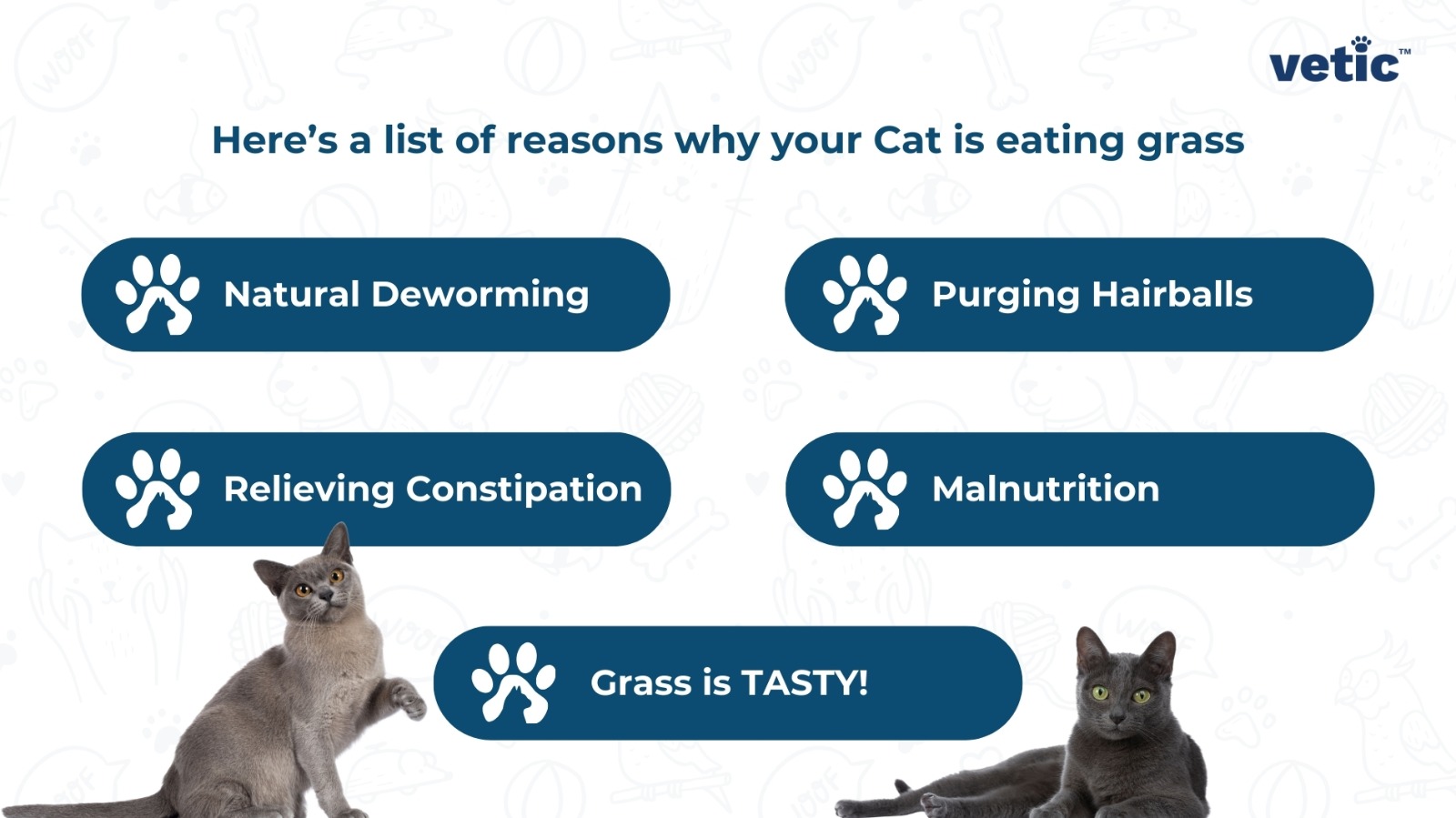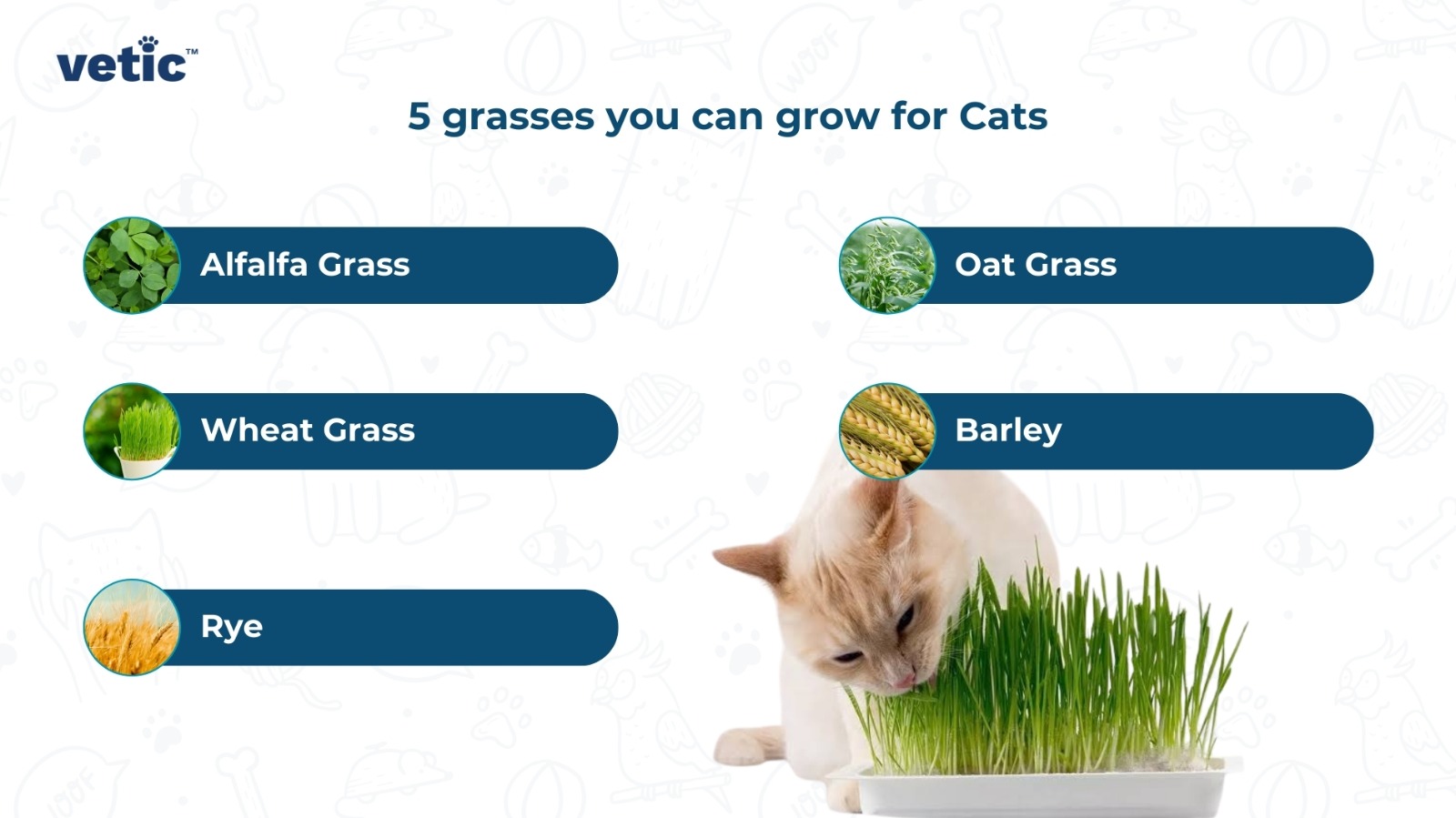My Cat is Eating Grass: Is it Strange?
Cat eating grass is not an uncommon sign. Indoor outdoor cats occasionally do munch on grass. Fully indoor cats may chew on the leaves of indoor plants. That’s not uncommon either.
Chewing and eating grass is a usual behaviour in most cats.
My Cat is Eating Grass: Is My Cat Sick?
Contrary to common belief, cats can eat grass even when they aren’t feeling sick. Sometimes, cats can eat grass when they aren’t nauseous.
Sadly, cats are compulsive carnivores and they cannot digest grass. So, they may end up vomiting the grass or passing them intact in their stool.
Your cat may not be sick if they are chewing or eating grass once in two to three months. However, you might want to visit a cat clinic near you if they are eating grass and throwing up more frequently.
Why is My Cat Eating Grass?

So, your cat is eating grass and here are some possible reasons why. Now, you must remember that we do not have enough studies on why cats eat grass, but we do have multiple theories from veterinarians and cat behaviourists.
Here’s a list of reasons why your cat is eating grass –
- Natural Deworming
- Purging Hairballs
- Relieving Constipation
- Malnutrition
- Grass is TASTY!
Expelling Parasites
A recent research by the International Society for Applied Etiology (Norway) found that animals eat grass to get rid of intestinal parasites.
If your cat has been eating grass frequently, you may need to check their deworming schedule. Higher worm-loads can drive cats to eat grass.
Purging Hairballs
Another paper challenges the previous theory since most first-world indoor cats do not have parasites. Yet, they seem to be driven to eating grass.
A different team of researchers believe that eating grass may help cats get rid of hair balls.
Relieving Constipation
Now, cats cannot digest grass, but grass is rich in roughage and that helps in the elimination of stool.
Interestingly, cats who do eat grass also manage to maintain fresh breath thanks to the all-natural chlorophyll content of the grass.
Malnutrition
Okay! So, even the most pampered indoor cat can develop some vitamin or mineral deficiency at times. And unlike us, cats try to make up for the deficiency by eating grass.
Does it work? Well, we do not know! But that gives you enough reason to visit a cat specialist or veterinary clinic for cats near you who can examine your cat for signs of deficiency diseases including anaemia.
Grass is tasty!
We aren’t the ones to judge. Some cats simply like to eat grass. Some cat parents state that their cats do not have any deficiencies but they do not stop eating grass.
Hence, we have no other conclusion other than – your cat probably just likes the taste of grass. Cats become bored of the same food quite frequently, and they will chew on a number of things including grass to get rid of the boredom.
If your cat has been chewing on plastic, clothing and paper almost compulsively, it’s time to consult a doc. Our veterinarians at Vetic Clinic Thane, Andheri and Kandivali in Mumbai.
Which Grasses Are Safe for Cats to Eat?
Some types of grass are safe for your cat.
Let’s face it! You cannot stop your cat from eating grass. So, you may have to ensure that the grass your cat is eating is safe for them.

5 grasses you can grow for cats –
- Alfalfa grass
- Oat grass
- Wheat grass
- Barley
- Rye
And if you want to treat your cat once in a while – you can definitely try to grow some catnip and silver vine!
Some grasses can be harmless for your cat. Just make sure to grow them in clean soil, water them properly, keep them free from pests and avoid using chemicals! Finding clean grass in cities like Delhi-NCR and Mumbai isn’t easy unless you grow them at home.
Is Grass Safe for Cats?
Cats are compulsive carnivores and eating a lot of grass cannot be good for them.
Never let your cat eat grass from your garden or lawn. Even when they are eating grass that you are growing inside just for them, give them around 5 to 10 mins to play, interact and eat. Then keep the plants away from their reach, in a secure area.
Eating very large chunks of grass or too much grass can cause intestinal blockage or excessive vomiting.
So, supervise them and give them limited access if you decide to grow any of the 5 above mentioned grasses you can grow for cats.
My Cat is Eating Grass: Should I be Worried?
It is always better to be safe than sorry when it comes to our pets. If your cat has been eating grass almost compulsively, you need to consult your veterinarian. You can book a veterinary visit with a cat specialist easily using the Vetic app. If you are in Mumbai, you can choose between Vetic Thane, Andheri and Kandivalli for your pet’s check-up.
Your veterinarian will consider your cat’s weaning history, age, diet, and health, before recommending tests or supplements.


